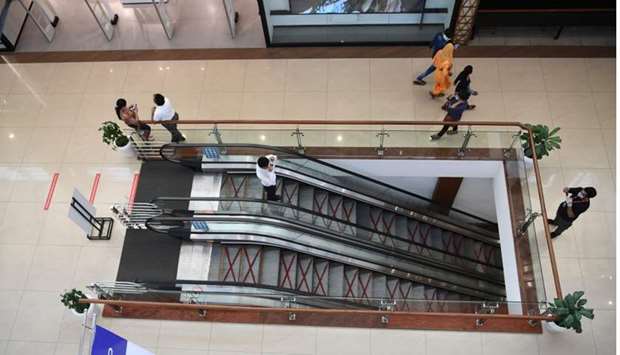Malls and temples opened across India on Monday after a 10-week lockdown, despite a record daily rise in new cases and predictions that the epidemic will worsen for weeks to come.
The government has risked easing restrictions in a bid to ease the devastating blow to the economy dealt by the coronavirus.But the number of new cases rose by 9,983 to 256,611, according to government figures announced Monday, putting the country of 1.3 billion on course to quickly overtake Britain and Spain among nations with the highest number of infections.
The reported death toll of 7,135 is lower than other badly-hit countries, but India's epidemic is only expected to peak in July. Many experts say the toll is higher.
In the capital, Delhi, shopping malls, restaurants, temples and mosques re-opened for the first time since March 25.
But highlighting the city's reputation as one of India's worst coronavirus hotspots, one day after announcing the reopening, Delhi chief minister Arvind Kejriwal went into isolation with virus symptoms including a fever.
The worst traffic jams in many weeks were seen in the city of 20 million people. But the public response to being able to shop and pray was tentative. There was only a trickle of people at most places of worship.
Businessman Mohit Budhiraja, wearing a mask and carrying sanitiser, went to his local temple in eastern Delhi for the first time since the lockdown.
"It felt like something was missing when I couldn't come to the temple for all these weeks," he said. "I hope things improve, but now I will come every day."
Many temples set up sanitisation tunnels at entrances and barred worshippers from bringing offerings.
"People are having their temperature tested twice before they get in," said Ravindra Goel, a trustee of the Jhandewalan temple, one of the oldest in Delhi.
The 400-year-old Jama Masjid mosque, one of the biggest in India, planned only three prayers a day instead of the usual five for Muslims. Worshippers also had to bring their own prayer mats.
Shopping malls also imposed tight checks at entrances and social distancing in stores. Owners acknowledged they would have to wait to see normal business levels return.
"This will last for at least two months, we will just have to rough it out," said Mahendra Singh, owner of a clothes franchise in one mall.
Delhi accounts for more than 27,600 cases and 761 deaths -- although media reports say the real figures are much higher. Shamika Ravi, an economics professor whose daily data analysis on the crisis is widely followed, said Delhi's deaths have risen "alarmingly".
The city government has ordered that hotels and banquet halls remain closed as they could be turned into hospitals.
Authorities have faced several complaints by relatives of people who have died before a hospital would accept them. Authorities say up to 15,000 extra beds could be needed by the end of the month.
"Citizens must be provided with real-time information on nearby testing labs, quarantine facilities, hospital bed availability," said Ravi.
"Fear and panic can only be dispelled by honest communication."
Mumbai accounts for around a fifth of India's cases and hospitals have been overrun. Authorities have been more cautious about lifting restrictions. Roadside shops reopened, but malls, restaurants and hair salons remained shuttered.
The Indian government says the tough lockdown has limited the spread of the coronavirus. But it is now braced for a major hit to the economy, with millions of labourers now jobless.
Rating agencies have said the economy could contract by more than five percent this year, after average growth of about seven percent over the past decade.

